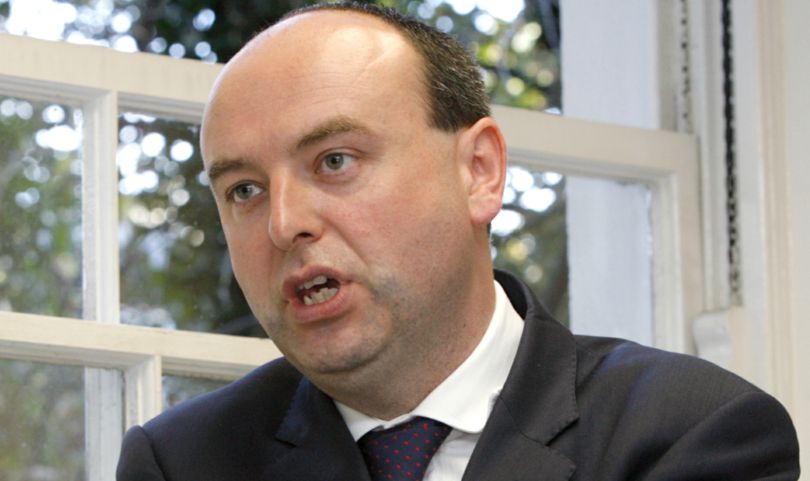Business organisation Ibec says the government is not doing enough to sustain business liquidity during the Covid-19 crisis.
The group is calling for significant new emergency cashflow and liquidity measures from the state to support vulnerable businesses.
Public affairs director Fergal O’Brien said: “Covid-19 is having a significant impact on liquidity in the economy. For many businesses, payment timelines are stretched, credit facilities provided by large firms are coming under strain, and the need for cash flow has greatly increased.
“Left without intervention, this will result in a significant spike in liquidations over the coming months and have the knock-on effect of a far slower return to normal operations, investment and expansion for firms who stay open through the crisis.”
He added that the European Commission’s new, temporary framework on state aid provides the ideal opportunity for the state to take an ‘aggressive’ approach to supporting firms in difficulty.
O’Brien (pictured) commented: “The state can now provide the benefit of low cost money directly into Irish SMEs and larger businesses in ways that are not possible in normal times. Solutions to rents and local rates challenges facing businesses must also be addressed.
“The total programme of guarantees, loans, and other supports in this Ibec report would help ensure €26 billion of liquidity to the economy, but at a maximum would leave the Exchequer exposure at €5.9 billion. Although these are significant sums, there are no cheap alternatives. Without the implementation of these measures the road to recovery from the crisis will be longer and more expensive.”
Liquidity Support
Pointing out that the EU’s new rules allow for grants up to €800,000 to a company to deal with urgent liquidity needs, loans at favourable interest rates, and state guarantees to cover loans from the banking system, the Ibec analysis calls for a range of specific measures, starting with liquidity support:
- The state should make available a total fund of €2 billion through the Strategic Bank Corporation of Ireland and Enterprise Ireland and its related on-lenders for low interest rate investment and working capital loans to impacted business of all sizes. These loans should be available at zero interest for the first twelve months, with the interest covered by the state.
- The state, through the Irish Strategic Investment Fund, should launch a commercial paper purchase programme targeted at the mid cap market.
- The state should cover the interest rate on new and existing loans through ISIF, the SBCI and the Microfinance loan scheme for a period of 12 months rather than introduce temporary deferrals.
- Ensure that European institutions adequately support non-financial corporates through the ECB's Corporate Sector Purchase Programme and ensure national Central Banks provide adequate guidance to companies accessing these facilities.
- Undertake an urgent review of staffing requirements, lending codes and associated regulatory requirements in banks in order to ensure loans can be processed in a timely fashion in order to meet time sensitive liquidity needs.
With regard to state guarantees, Ibec wants the following:
- Extend the SME credit guarantee scheme to cover re-financing of existing loans, extend the total portfolio cap to 50% and the facility cap to €5m.
- Remove the 0.5% facility premium on the SME credit guarantee scheme and provide state cover for the interest rate on new and existing loans under the SME credit guarantee for an initial period of 12 months.
- To ensure the expected gap in supply of export credit insurance does not affect the ability of Irish firms to export, introduce a new scheme covering short term export credit insurance for companies, in line with the new temporary state aid framework.
- Put in place extended guarantees to allow invoice lenders to extend sums above their normal advance rate with the comfort of the state guarantee of up to 15% of the funds in the case of non-payment.
Beyond these measures, Ibec also wants tax forbearance including the right to defer VAT and excise payments for up to six months, extension of tax deadlines, funding to allow local authorities to defer business rates, new tax deductions for coronavirus-related costs and interest charges, and a payment of up to €15,000 to SMEs that have signed up to Revenue’s wage subsidy scheme.
SME Cash Grants
Ibec’s Small Firms Association has published a policy paper highlighting the growing concern among small businesses that more needs to be done by government to support small firms.
Graham Byrne, chair of SFA National Council, stated: “Until circumstances return to normal it is vital that additional cashflow and liquidity measures are introduced that will allow small firms to survive and bounce back.
“For small businesses to recover, they need a cash grant to enable them to meet current outgoings, 100% relief on business rates for the remainder of 2020 and VAT deferral for the next two quarters," said Byrne. "To further meet the liquidity crisis, €2 billion should be made available through the Strategic Banking Corporation of Ireland for low interest rate investment and working capital loans to impacted businesses.
“To alleviate uncertainty and maintain competitiveness, the next government must provide certainty to the small business community by introducing debt forgiveness and tax changes to support investment, consumer spending and job creation.”
The SFA is also calling for the creation of a SME Reboot Taskforce.








